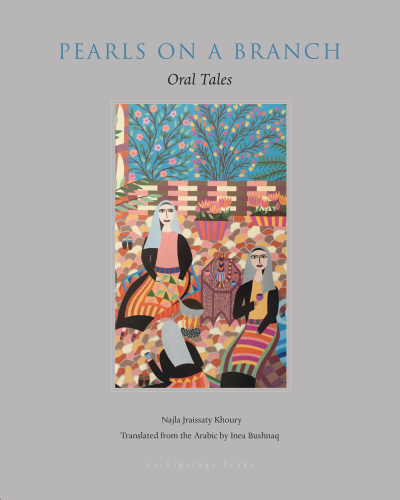
Pearls on a Branch
Oral Tales
کتاب های مرتبط
- اطلاعات
- نقد و بررسی
- دیدگاه کاربران
نقد و بررسی

December 1, 2017
Collected by Khoury as the basis for plays performed by the traveling theater group she founded during Lebanon's civil war, these tales are radiant with sunlight and flowers, jinns and spirits, palaces and sultans. The setting you might expect, which makes them refreshingly different and a pleasure to read. Yet the themes will resonate with anyone who loves fairy tales and folklore, pointing out commonalities within the Middle East framework. From comeuppance and transformation, sly tricksters tricked, good people rescued from bad ogres, wishes satisfied, beautiful young women finding the right (rich or royal) man, and love finally requited, readers will recognize where they are. "O Palace Beautiful! O Fancy Friend!" mirrors Snow White's story astonishingly ("O Palace Beautiful! O Fancy Friend"/ Is there anyone like me in the land") though in its own way is more disturbing. Beautifully translated, these pieces ring with numerous, addictive songs and chants. VERDICT An absolute delight for readers young and old.
Copyright 2017 Library Journal, LLC Used with permission.

January 1, 2018
Khoury originally published these 30 tales in Arabic in 2014, having collected them as she traveled through Lebanon with a puppet troupe during the country's civil war from 1975 to 1990.The storytellers shared tales from their oral tradition with Khoury. Instead of a Western fairy tale's promise of "Once upon a time," these Arab tales begin with the charming, more realistic equivocation, "There was or there was not." Yet Western readers will recognize the wicked stepmothers, princes in love with poor girls, plucky unloved children, sorcerers and talking animals. Rapunzel-like heroines grow up locked away from the world in stories like "The Girl Who Had No Name" and "Thuraya with the Long, Long Hair." A huntsman substitutes animal blood for the blood of the Snow White-like damsel he's hired to kill in both "Lady Tanageesh and the Eggs of the Tawawees" and "O Palace Beautiful! O Fancy Friend!" whose heroine sets up household with Ali Baba's 40 thieves (instead of seven dwarfs) until an old woman shows up with a deadly apple. There's an Aesop ring to animal fables like "Abu Ali the Fox," about a fox taking birds under his protection until he gets hungry. However, the attention paid to bodily functions may startle Western readers. "A Cow Called Joukha" centers on farting, while a sweet romance centers on "The Singing Turd." According to Khoury, in the oral tradition, "certain stories told by women were for women only." Both proto-feminist innuendo--crafty women outwitting men--and sexual double-entendres abound. So "Jubayne the Fair" agrees to let an old man suck her finger whenever he wants until she wises up and runs away. And in the complex title story, a king rejects his only daughter because he mistakenly thinks she's tried to trick him into bringing her a husband when he travels to Mecca; she seeks revenge on the young man who caused this disgrace through overt sexual trickery and bed-swapping.A funny, bawdy, occasionally gruesome, and decidedly adult collection that celebrates small cultural variations amid large universal values.
COPYRIGHT(2018) Kirkus Reviews, ALL RIGHTS RESERVED.

February 1, 2018
Khoury traveled throughout Lebanon during its civil war, collecting oral tales of women whose societal roles were proscribed in the extreme. She founded a theater troupe and used the tales as primary source material, from which she created plays for the troupe to perform. She has now winnowed the collected oral tales from 100 to 30 unique stories, many of which share ideas similar to such western fairy tales as Snow White. Often, the lowly are exalted, and deception is employed, as in the eponymous story, in which a young woman, by cunning, wins her pearls on a branch. Many times these stories express a desire to upend power structures. Fairies do not play a role here, and notions of good and evil are not as categorical as in western tales. One could look for hints of protofeminism or use for comparative literature or read for pure enjoyment. The author's and translator's notes are helpful for appreciating the tales as expressions of women who had no voice except among themselves.(Reprinted with permission of Booklist, copyright 2018, American Library Association.)

























دیدگاه کاربران